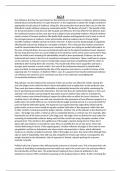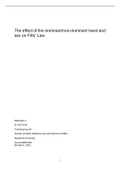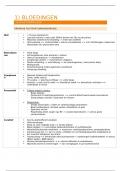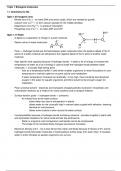One influence that has the most impact on the outcome of criminal cases is evidence, which includes
both physical and testimonial. It is upto the juries’ or the magistrate to attach the weight considered
appropriate to each piece of evidence. Using this, the prosecution must prove their case on why the
defendant is guilty without raising any reasonable doubt (“The Burden of proof”). The benefit of this
for the prosecutions is that they are able to guide and influence the trial whilst for the defence team
the workload increases as they now also have to disprove the presented evidence. Physical evidence
mainly consists of forensic evidence (like bodily fluid samples and fingerprints) and is seen as one of
the strongest pieces of evidence. Juries will prioritise physical evidence due to it being highly
scientific making it reliable and hard to falsify. However, it does have the disadvantage of negatively
affecting the outcome by leading to a wrongful conviction. This is because the evidence presented
could be contaminated due to human error meaning the juries are relying on invalid information. In
the case of Amanda Knox, she was convicted primarily due to the physical evidence found. However,
the bra strap that was seen as crucial evidence of her presence at the crime scene was found 47 days
after the initial search meaning the admissibility should’ve been questioned. Evidence can also be
testimonial and comes in the form of eyewitness and expert statements. These could have an impact
on the outcome as the juries may be emotionally swayed and start sympathising with the victim or
defendant after hearing their side of events. This would make them more supportive and have a
stronger push towards a certain verdict. Vice versa if the testimonies deemed as unbelievable –
juries are likely to start questioning the side of the argument and come to a verdict in favour of the
opposing side. For instance, in Stephen Miller’s case, it is apparent how heavily testimonial evidence
can influence the outcome as his conviction was due to his confession outweighing the
circumstantial evidence of alibis.
The judiciary can also influence the outcome of the case as they can affect the verdict. During the
trial, the judges must clarify the laws to juries and explain how to apply them to the particular case.
They must also deem evidence as admissible or inadmissible during the trial whilst monitoring the
line of questioning used by both side parties. The fact that they are authoritative figures in the court
and their role includes summarising the key points to jurors (before they retire to conclude the
verdict) means even minimal hinting of support for either side can affect the jurors' decisions. This
could be seen in Mr Wangs case who was convicted for the possession of two offensive weapons in a
public place. No lawful defence was mentioned by the judge showing how he in a sense directed the
juries to find the defendant guilty. The Supreme Court agreed that the judge likely influenced the
guilty verdict as jurors were unable to equally consider both sides of the argument, which then led
to their verdicts revolving around the judge's opinion. Another role of the judiciary is the dismissal of
cases – the judge may order a retrial as well as completely dismiss a criminal case. For example, after
hearing the use of the honey strap in Colin Stagg case, the judge chose to dismiss the case under the
reasoning of inadmissible evidence being used and the overall case using ‘deceptive conduct of the
grossest kind.’ This reinforces the significance of the judge's opinion during trial as if they don’t
agree with any evidence or procedures used, they can prohibit the use of it by jurors, hence the
verdict likely being in favour of the opposing party. Another influence of judges is they may be more
sympathetic and bias to defendants who share similar characteristics to them, which ultimately
results in an unfairly considered outcome. 68% of the judges are male, this means that although they
take an oath of impartiality, they still may lack empathy for female rape victims. Consequently, the
weight attached to the defendant's side of argument is limited, unjustly pushing the outcome
towards not guilty.
Politics hold a lot of power when influencing the outcome of criminal cases. This is because their role
consists of amending or proposing new laws which are used in the court room: the outcome reflects
the introduction of these laws. The predominant making of laws is done by politicians in the
parliament, however MPs contribute by passing on the proposed laws to them. If after reviewing the





